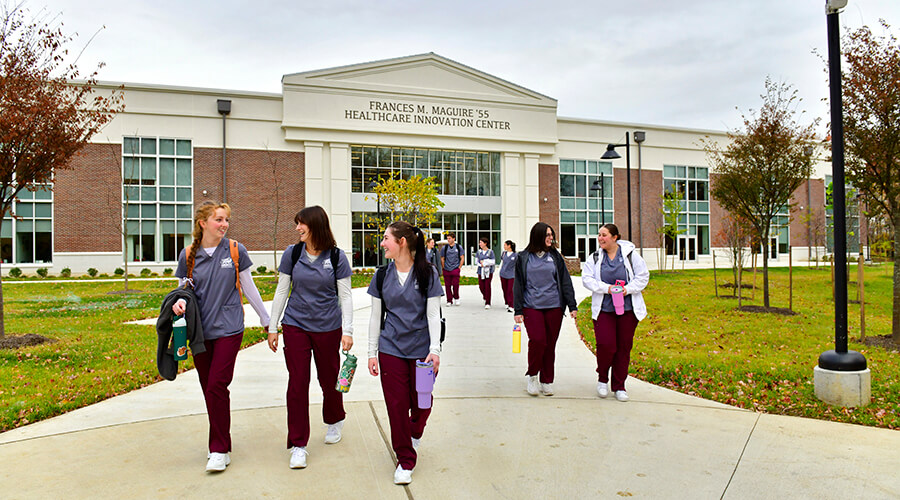What Does a Nurse Practitioner Do?

A highly in-demand career path, nurse practitioners rank as the #1 job in U.S. News & World Report's Best 100 Jobs list for 2024.
For students interested in learning how to become a nurse practitioner, understanding the duties for which these healthcare professionals are responsible can offer a clearer picture of the challenges and rewards available in this field. If you decide this is the right career for you, pursuing a nurse practitioner program is an essential step in order to qualify for a position in this field.
- What Is a Nurse Practitioner?
- How Long Does it Take to Become a Nurse Practitioner?
- Nurse Practitioner Job Description
- How Much Do Nurse Practitioners Make?
- GMercyU, Your Pathway to Success
What Is a Nurse Practitioner?
A nurse practitioner is a healthcare service provider; they are also known as advanced practice registered nurses. Board-certified nurse practitioners diagnose and manage acute and chronic health problems, promote health and disease prevention, educate and counsel individuals and families, and work in coordination with other healthcare professionals in hospitals, clinics, private practices, and research environments.
Nurse practitioners must be licensed to practice as registered nurses in their states and must typically achieve certification from a national organization, such as the American Nurses Credentialing Center and American Academy of Nurse Practitioners, or the Pediatric Nursing Certificate Board (PNCB). Experience in the field of nursing is also typically required for licensure and certification.
Nurse Practitioner Career at a Glance
| Job Description | A nurse practitioner is a licensed healthcare provider |
| Educational Requirements | Master's or Doctorate Degree |
| Relevant Certifications | State License |
| Average Salary | $125,900 |
| Expected Job Growth | 45% (more than 15x the national average) |
How Long Does It Take to Become a Nurse Practitioner?
Because the process to become a nurse practitioner varies depending on education already earned, it can take three to eight years to complete all educational and licensure requirements. It typically begins with earning a four-year Bachelor of Science in Nursing degree, followed by a preferred year of clinical experience in the field, then earning a Master of Science in Nursing (MSN-NP) degree, which can take two or three years. Some advanced roles in the field may require a Doctor of Nursing Practice (DNP) degree, which can require another two to three years of part-time study.
To achieve success in this fast-paced field, nurse practitioners must:
- Stay current with new developments in the field of medicine and healthcare
- Have superior communication skills to obtain information from patients and to record that data accurately
- Display empathy and compassion, which are critical for professionals in all areas of the healthcare industry
- Maintain attention to detail and strong analytical skills
Because these medical professionals are often called upon to supervise or oversee others, leadership qualities are also necessary to ensure the best results for nurse practitioners in real-world situations.
Nurse Practitioner Job Description
Nurse practitioners are in high demand in the job market thanks to their advanced training and a high degree of competence in a variety of medical environments. In fact, according to the U.S. Bureau of Labor Statistics, they share the #1 ranking for fastest-growing occupation in the country with an expected job growth rate of 45% through 2032 — 15x the national average.
The job description nurse that practitioner applicants can expect will change depending on the specialty field they elect to pursue and the organization where they intend to work. Some of the most important nurse practitioner job duties may include the following:
- Recording patient histories
- Ensuring medical records reflect symptoms, treatments, and administration of prescribed and over-the-counter medications
- Performing intake duties to obtain information from patients and, in some cases, from families or guardians
- Offering support for underserved/rural communities as primary caregivers who can:
- Perform routine and detailed examinations
- Prescribe some medications
- Ordering diagnostic tests and operating some kinds of equipment in the medical environment
- Evaluating test results to determine underlying physiological reasons for patient symptoms
- Diagnosing medical conditions and devising treatment plans designed to alleviate pain and to stop the progress of diseases and conditions
- Supervising the activities of nurses and other staff in clinics and hospitals to ensure tasks are completed promptly and patients receive the best care possible
- Educating patients and families about medical conditions and treatment plans
- Collaborating with others in the healthcare field to share knowledge, create treatment regimens and diagnose patients with unusual or difficult sets of symptoms
- Collecting and compiling information and samples from patients
- Performing scientific procedures using cell cultures and other biological materials
- Specializing in a wide range of medical categories, including:
- pediatric care
- geriatrics
- family practice
- acute care nursing
- emergency room nursing
Students can select a specific patient population track — such as family, adult-gerontology or pediatrics — for their master's of science in nursing (MSN-NP) degree.
How Much Do Nurse Practitioners Make?
According to the U.S. Bureau of Labor Statistics, the median annual salary for nurse practitioners in May 2022 was $125,900. The highest 10% earned more than $208,080, making this one of the best-paying careers in the nursing industry. Compensation may also include health and life insurance, childcare benefits, tuition reimbursement, and flexible work schedules. In the hospital environment, nurse practitioners typically work long hours and may be required to perform their duties on call or in shifts that could cover nights, weekends and major holidays. Individuals who are employed by private practices and clinics generally work regular schedules on weekdays and sometimes on weekends; however, they are not usually asked to work on holidays or at other times when the facility is closed.
| Nurse Practitioner Job Titles | Average Annual Salary |
| Acute Care Nurse Practitioner | $101,342 |
| Adult Gerontology Nurse Practitioner | $90,102 |
| Emergency Nurse Practitioner | $96,841 |
| Family Nurse Practitioner | $94,232 |
| Pediatric Nurse Practitioner | $89,764 |
| Women's Health Nurse Practitioner | $91,270 |
GMercyU, Your Pathway to Success
Before you can become a nurse practitioner, you must first earn an undergraduate nursing degree and launch your career as a nurse. GMercyU offers three CCNE-accredited programs for becoming a nurse:
Hybrid Accelerated BSN — Our accelerated, innovative nursing program is a hybrid, full-time, 16-month, 67-credit degree program designed for students who want to earn a nursing degree while already having a bachelor's degree in another field.
Hybrid Weekend BSN program — This second-degree hybrid nursing program can be completed in three years and is available to students with a bachelor's degree in another field who want to transition to a career in nursing.
Bachelor of Science in Nursing (BSN) degree program — This traditional four-year undergraduate BSN program is for aspiring nurses who do not already have a bachelor's degree in another field.
Start your journey today! Contact our Admissions office; we look forward to the chance to help you launch your nursing career.
